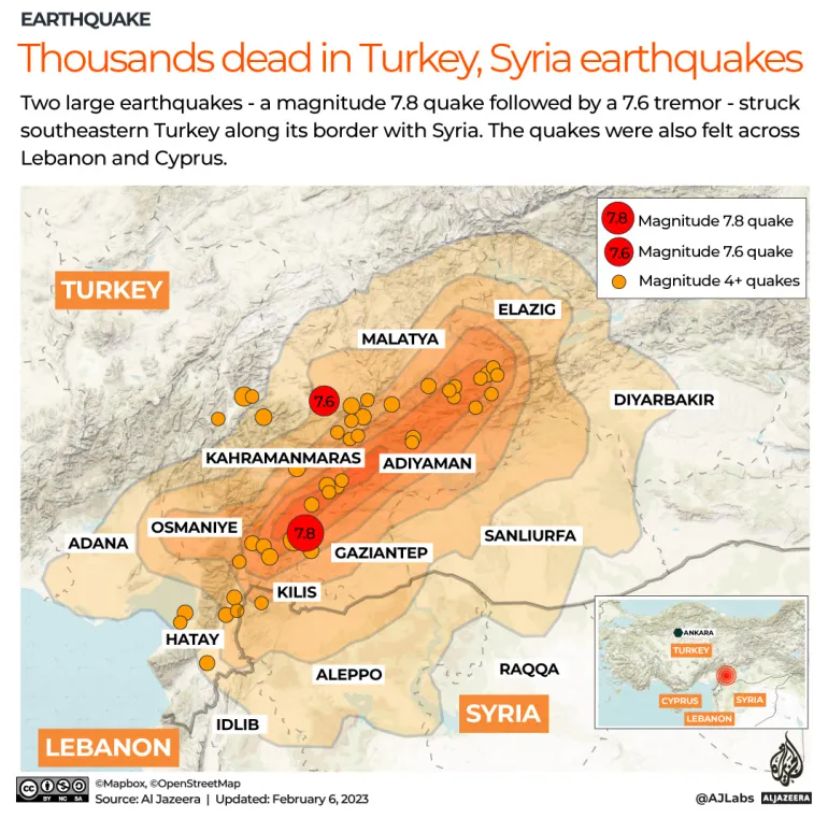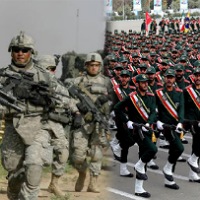International News
Turkey/Syria Eartquake: Govts, Civil Societies, Jointly Coordinate Rescue Operations

More than 7,800 people have been rescued across 10 provinces, according to Orhan Tatar, an official with Turkey’s disaster management authority as already strained medical facilities are quickly filled with injured people.
The Syrian American Medical Society, which runs hospitals in northern Syria and southern Turkey, said in a statement that its facilities were “overwhelmed with patients filling the hallways” and called urgently for “trauma supplies and a comprehensive emergency response to save lives and treat the injured”.
Governments and aid agencies have rushed to deploy personnel. However, emergency crews on the ground have remained few and far between, with their efforts impeded by frigid temperatures and close to 200 aftershocks, making the search through unstable structures perilous.
More bad weather is expected to hit the region, further hampering rescue operations. Downed buildings and destroyed roads have also made it difficult to find survivors and get crucial aid into affected areas. Several airports have also been closed after being damaged by the earthquakes.
Harrowing accounts are emerging from isolated areas, such as in Turkey’s Hatay region, where officials say as many as 1,500 buildings were destroyed and many people reported relatives being trapped under the rubble with no aid or rescue teams arriving
The European Union has mobilized search and rescue teams, and the bloc’s Copernicus satellite system has been activated to provide emergency mapping services. At least 13 member countries have offered assistance.
The United States has ruled out dealing directly with the Syrian government, but Washington is coordinating immediate assistance to NATO-member Turkey, including teams to support search and rescue efforts.
Pakistan has dispatched its first batch of rescue teams and relief goods to Turkey, while 10 units from the Russian military have already been deployed to Syria to help clear debris and search for survivors. Moscow has also offered help to Turkey, which has been accepted.
Jordan is sending emergency aid to both countries and Egypt has pledged urgent humanitarian help to Turkey. Lebanon’s cash-strapped government is also sending Red Cross and Civil Defence first responders and firefighters to Turkey to help with its rescue efforts.
International News
Gabonese Voters Head To Polls In First Presidential Election Since 2023 Coup
Gabonese citizens lined up at polling stations on Saturday to cast their votes in a landmark presidential election, the first since the military ousted the Bongo dynasty in a coup last August.
Eight candidates are vying for the top job, but all signs point to junta leader General Brice Oligui Nguema — the man behind the August 30, 2023, coup — emerging as the frontrunner.
Oligui, who toppled Ali Bongo and ended 55 years of family rule widely criticized for corruption and economic mismanagement, has dominated opinion polls in the run-up to the vote.
In the capital, Libreville, snaking queues formed outside polling stations as voters turned out early.
READ MORE: Gabon Extends Investment Offer To Dangote Amid Nigerian Attacks
Among them was 30-year-old Aurele Ossantanga Mouila, who cast his ballot for the first time after finishing a night shift at a casino.
“I did not have confidence in the earlier regime,” Mouila told reporters, echoing the sentiments of many young voters hoping for change in the oil-rich central African nation.
Oligui, who served as transitional president while civilians drafted a new constitution, swapped his military uniform for campaign attire as he seeks a seven-year mandate.
He faces seven challengers, including his main rival, former Prime Minister Alain-Claude Bilie By Nze, a longtime insider under Ali Bongo who now brands himself as the face of a “complete rupture” from the past.
Despite Oligui’s promises of reform, critics question his commitment to breaking with the old system, noting his deep ties to the Bongo era.
His campaign slogan, “C’BON” — a clever wordplay blending his initials with the French phrase for “It’s good” — has been plastered across Libreville, while rival candidates struggle for visibility.
As roughly 920,000 registered voters cast their ballots, the election is taking place against a backdrop of pressing national issues.
High unemployment, failing infrastructure, regular power outages, and soaring government debt — projected to reach 80 percent of GDP this year — have fueled public frustration.
Analysts, like political observer Neyer Kenga, say the vote represents a critical test for Gabon’s return to civilian rule and constitutional order.
“Today all Gabonese are firmly in favour of a democratic game that is played within the rules,” Kenga noted, adding that the outcome remains uncertain in a nation scarred by post-election violence in 2009 and 2016, as well as last year’s coup.
The interior ministry has pledged a “transparent ballot” and results are expected by Monday. Meanwhile, Oligui remains confident of victory.
“The builder is here, the special candidate, the one you called,” he declared at his final rally, as music and dancing filled the streets of Libreville.
International News
US Missionary Abducted During Church Service In South Africa
A US missionary was kidnapped at gunpoint while leading a prayer service at a church in the coastal city of Gqeberha, South Africa, on Thursday evening.
Pastor Josh Sullivan, 45, was taken by four armed and masked men who stormed the Fellowship Baptist Church in Motherwell during his sermon, authorities reported on Friday.
The attackers, who reportedly robbed two cell phones before abducting Sullivan, left the church in a vehicle with the pastor.
SEE ALSO: Gunmen Kidnap Navy Officer, Two Others In Abuja
“They knew him by name,” said Reverend Jeremy Hall, a fellow pastor in the area. “They took him at gunpoint and forced him into his car.”
The abduction took place as Sullivan was hosting a prayer meeting attended by around 30 people, including his wife and six children.
The vehicle was later found abandoned approximately 1.5 kilometers from the church.
Police are investigating the possibility that the kidnapping was motivated by financial gain, with suspicions of ransom demands.
Kidnapping for ransom has been on the rise in South Africa, with criminal gangs increasingly targeting individuals who can bring in large sums of money.
Hall, who is also based in Gqeberha, suggested the incident was likely “financially related,” further adding to concerns about the growing threat of organized crime in the region.
This follows another kidnapping in the same area earlier this week, involving a Chinese national.
Statistics from South African authorities show a disturbing trend, with over 17,000 kidnappings reported during the 2023/2024 financial year — an 11 percent increase from the previous year.
Sullivan, along with his wife and children, moved to South Africa from Tennessee in November 2018 to engage in missionary work.
Investigations are ongoing, and no arrests have been made at this time.
International News
Trade War: China Strikes Back Wth 125% Tariffs On U.S. Goods
In a sharp escalation of the ongoing trade war, China announced it will impose tariffs of up to 125% on U.S. imports starting Saturday, in response to President Donald Trump’s recent decision to raise duties on Chinese goods to 145%.
The tit-for-tat tariff hikes have heightened fears of a prolonged standoff between the world’s two largest economies, with analysts warning of potential disruptions to global supply chains.
The White House had recently intensified pressure on China by excluding it from a 90-day tariff pause granted to dozens of other countries.
READ ALSO: Trump steps up trade war with $200 billion in tariffs
The move was widely seen as a direct challenge to Beijing, which remains the second-largest supplier of goods to the U.S.
In a strongly worded statement, China’s Finance Ministry condemned the U.S. move, calling it a “serious violation of international and economic trade rules” and labeling it as “unilateral bullying and coercion.”
China’s Commerce Ministry also signaled a firm stance, warning that it would “resolutely take countermeasures” and “fight to the end” if Washington continues what it called substantive infringements on Chinese interests.
“If the U.S. continues to impose additional tariffs on Chinese goods exported to the U.S., China will ignore it,” the ministry added, dismissing the tariff war as “a numbers game” with “no practical economic significance.”
China urged the U.S. to back away from the confrontation and “completely correct its wrongful practices” by removing the so-called reciprocal tariffs, which have become a flashpoint in U.S.-China economic relations.

















